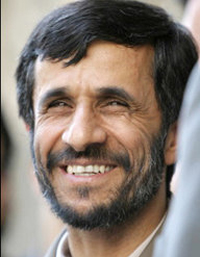|
Tehran:
Mahmoud Ahmadinejad, Iran's president, has said he is ready to
co-operate with Western powers on nuclear fuel and technology
issues.
"We welcome fuel exchange, nuclear co-operation, building of power
plants and reactors and we are ready to co-operate," he said in a
live broadcast on state television, as Tehran reportedly responded
to a UN-drafted deal on atomic energy.
But Ahmadinejad added Iran would not retreat "one iota" on its
nuclear rights, and that the provision of nuclear fuel to a Tehran
reactor would test the "honesty" of world powers.
His comments come a week after the International Atomic Energy
Agency (IAEA), the UN's nuclear watchdog, mooted a deal that would
see Iran ship out 75 per cent of its low-enriched uranium abroad.
Al-Alam TV, a state-owned Arabic channel in Iran, reported that
Tehran had delivered its response to the draft deal on Thursday,
which has already been officially backed by the US, Russia and
France.
But the IAEA has not yet confirmed the report.
The pact was designed to help allay fears from Western nations that
believe Iran intends to build nuclear weapons - a charge Tehran
denies.
'Buying time'
Local media have said Tehran will accept the framework of the deal,
but also demand changes to it.
Javan,
a pro-government newspaper, reported that Iran will seek two changes
to the plan.
They include, it said, the gradual shipment of its low-enriched
uranium abroad, instead of sending it in one go, and a "simultaneous
exchange" of nuclear fuel to a Tehran research reactor in return for
its shipment of uranium.
Nazanine Moshiri, Al Jazeera's correspondent in Tehran, said it
appears that Iran will "not give up its right to enrich uranium but
it is willing to co-operate on an exchange".
She said this move would allow Iran to "buy time".
"Iran will still continue to produce enriched uranium at its Natanz
plant, whatever it sends out they'll be able to replace very
quickly, and if it sends anything out it will get highly enriched
uranium replaced at the same.
"So in a way Iran is not really giving an inch on this at all."
Iran's formal proposal is expected to be handed over to the IAEA in
Vienna, Austria.
Nuclear inspection
It comes as a team from the IAEA returned to Vienna after inspecting
a controversial nuclear plant near the Iranian town of Qom.
Last month's disclosure over the Qom plant added to international
concern over Iran's atomic programme.
Iran has already been enriching uranium - the most controversial
aspect of its nuclear project - for several years at another plant
in the central city of Natanz, in defiance of three sets of UN
sanctions.
Enriched uranium produces fuel for civilian reactors, but in highly
extended form can also make the fissile core of an atomic bomb.
|





